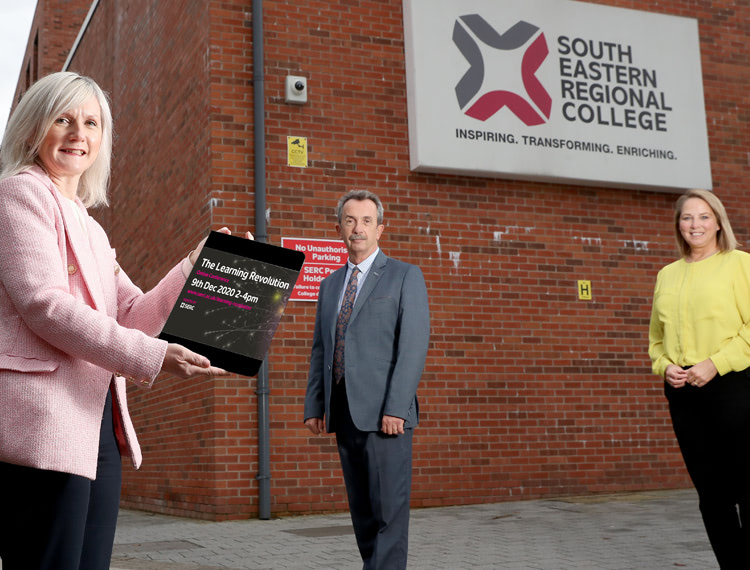Learning Revolution Conference Challenges Traditional Model of Education

South Eastern Regional College (@S_ERC) is set to host an online international conference which challenges the traditional model of education and aims to create a shared view of what is needed to prepare learners for an increasingly uncertain future. The Learning Revolution conference, for educators, parents, policy makers, awarding organisations, business leaders and entrepreneurs, is online at 2.00pm – 4.00pm GMT on 9 and 14 December 2020.
The Learning Revolution conference looks to those who have created deep and sustained change and brings together progressive innovators who have led the way in transforming how we educate for the future.
Dr Michael Malone, Director of Curriculum and Information Services at SERC said, “The pandemic has brought into focus the need to redefine the competencies and skills that learners need to develop in order to thrive in the classroom, work and life. We want high value, high skills economies and for this to become reality there is a need to have a well-skilled workforce. This may mean a disruptive shift for education today. Often qualifications are seen as a proxy for skills, but increasingly employers are noting the need for wider competencies required for the workplace. The ability for employees to undertake more complex tasks will become crucial. We need to evaluate whether our education system is equipping students with transferable skills such as critical thinking, problem solving, and collaboration, to thrive in work and life.
He added, “Education is the engine that fuels the development of citizens who will contribute effectively to society and economic progress. Every country will have their own view of what education should look like. Now is the time to come together globally and shape this future.
Paula Philpott, Head of SERC’s Learning Academy said, “Educating for an unknown future, is challenging us as educators around what is worth learning and how it is best learned. In this information driven age, the boundaries of the traditional classroom have changed and with it the role of the teacher. This has an impact on initial teacher education and teacher professional development. The opportunities inherent in our 21st Century such as technology, automation and global connectivity are also drivers for change around assessment and create an opportunity for greater innovation.
She added, “The literacies associated with the present model of education are inadequate in addressing the current industrial and societal challenges. Grounding the classroom in work that is relevant and meaningful, creates a sense of purpose and agency in learning. There are those locally, nationally and internationally who have led the way in creating an ecosystem that embraces that change. The degree to which education changes in the next decade will be proportional to the extent to which we embrace this change.”
Speakers include, Julie Wilson, a native of Northern Ireland who is the Boston-based Founder and Executive Director of the Institute for the Future of Learning. Speaking on how the current crisis has shaped thinking about how education needs to change and drivers for this change beyond the pandemic Julie said, “The fact that the majority of jobs that will be available in 5 or 10 years don’t exist yet, means that education has the task of educating children for what is an unknowable future. This is a major driver for change.
“In addition, there is much that we are learning now through neuroscience and how people learn, that could be applied to teacher preparation and to school leadership. There is a great body of knowledge that we should be leaning on a whole lot more than we are. Another driver is the growing mental health crisis. We have kids, and it doesn’t matter what demographic they come from – high poverty areas, upper middle class – the stresses and the overwhelm that these kids are facing is extraordinary, just with the pace of change that we have, the pressure of social media, the pressure of education. I sometimes joke that I don’t think that I could get into university these days – given the very thin resume that I had at age 17 –it is kind of nuts as we are asking our 17 year olds to have these very professional resumes and they are still children.”
Olly Newton, Executive Director of the Edge Foundation, who will also be speaking at the conference said, “The challenges of examination-based assessment have been present for a long time but this year has really shone a light on them. We have helped to found a movement called Rethinking Assessment which aims to look at the wide range of different options and models from across the world.
He added, “What is clear is that we need to move away from the Nineteenth Century focus on written exams as the only ‘rigorous’ method of assessment. They have their place, but amongst a much wider range of tools. International examples such as the International Baccalaureate, mastery transcript and passage presentations all give us an insight into the wider range of holistic assessments that would be more appropriate for the Twenty-First Century.”
The Learning Revolution Online Conference is free to attend but tickets must be booked online at serc.ac.uk/learning-revolution where you can also view the Learning Revolution concept paper.
South Eastern Regional College (SERC) is set to host an online international conference which challenges the traditional model of education and aims to create a shared view of what is needed to prepare learners for an increasingly uncertain future. The Learning Revolution conference is online at 2.00pm – 4.00pm GMT on 9 and 14 December 2020. The conference is free to attend but tickets must be booked online at serc.ac.uk/learning-revolution where you can also view the Learning Revolution concept paper.











Responses